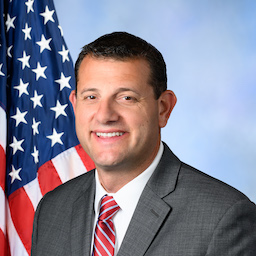- Home
- About
-
Services
- Art Competition
- Community Project Funding Map
- Congressional App Contest
- Congressional Certificate
- Event Request
- Flag Request
- Grants
- Grant Letters of Support
- Help with a Federal Agency
- Inauguration
- Internships
- Kids Page
- Meeting Request
- Service Academy Nominations
- Tour Requests
- Vietnam Veteran Commemoration
- Government Shutdown FAQ
- Issues
- Media
- Contact

Press Releases
Congressman Valadao Urges Transparency from the VA on Contracting Practices
Washington,
March 12, 2024
|
Faith Mabry
Today, Congressman David G. Valadao (CA-22), a member of the Appropriations Subcommittee on Military Construction and Veterans Affairs, led his colleagues in a letter to the Secretary of Veterans Affairs Dennis McDonough regarding the Department of Veterans Affairs (VA) contracting of the consulting firm McKinsey and Co. (McKinsey).
WASHINGTON – Today, Congressman David G. Valadao (CA-22), a member of the Appropriations Subcommittee on Military Construction and Veterans Affairs, led his colleagues in a letter to the Secretary of Veterans Affairs Dennis McDonough regarding the Department of Veterans Affairs (VA) contracting of the consulting firm McKinsey and Co. (McKinsey) The lawmakers raise concerns over reports that McKinsey provided consulting services to the VA while simultaneously advising opioid manufacturers on ways to increase the usage of prescription opioids among veterans. The letter was first reported by Military.com. “It has become increasingly clear that McKinsey’s unprecedented access to VA decision making, strategy, and policy formulation allowed them to exploit their consulting contracts to the benefit of their opioid manufacturer clients and to the detriment of many veterans suffering from injuries sustained during their service. Given the immense societal damage caused by prescription opioids, it is unacceptable that any private entity involved in the proliferation of these medications had the ability to influence the VA in its medical treatments of American veterans,” the members wrote. In the letter, the lawmakers request additional information on the procedures the VA has in place to prevent potential conflicts of interest with contractors and consultants. Rep. Valadao was joined in the letter by the Chairman of the Appropriations Subcommittee on Military Construction and Veterans Affairs, Rep. John Carter (TX-31), along with Reps. Ryan Zinke (MT-01), and John Rutherford (FL-05). All signers are members of the Subcommittee. You can read the full letter here or below: Dear Secretary McDonough: We are deeply concerned about the reported relationship between the U.S. Department of Veterans Affairs (VA) and McKinsey & Company (McKinsey). Released documentation shows McKinsey was advising the VA on a variety of projects, including healthcare delivery, IT modernization, and facility management. These consulting services were provided while McKinsey also maintained a relationship with, and provided services to, many leading producers of opioid medications, including Purdue Pharma L.P. and Johnson & Johnson. These companies specifically targeted veterans in much of their marketing, advertising, and outreach, at least partly, on the advice of McKinsey consultants. It has become increasingly clear that McKinsey’s unprecedented access to VA decision making, strategy, and policy formulation allowed them to exploit their consulting contracts to the benefit of their opioid manufacturer clients and to the detriment of many veterans suffering from injuries sustained during their service. Given the immense societal damage caused by prescription opioids, it is unacceptable that any private entity involved in the proliferation of these medications had the ability to influence the VA in its medical treatments of American veterans. Federal agencies have apparently failed to enforce laws and regulations regarding organizational conflicts of interest, allowing McKinsey to disregard them without any consequences. Last year, the House Committee on Oversight and Reform released a report exposing McKinsey for engaging in contracts with the Food and Drug Administration (FDA) while simultaneously providing consulting services to opioid manufacturers. McKinsey failed to disclose this conflict of interest – a blatantly unethical practice and, potentially, a violation of federal law. Additionally, the report shows McKinsey consultants were found to have leveraged their position with both entities to increase business of opioid manufacturers and influence federal officials. Similarly, VA awarded McKinsey at least four consulting contracts spanning a wide range of the Department’s operations. VA procurement officials testified to the House Committee on Veterans’ Affairs that they only assessed the potential for organizational conflicts of interest in two of those contracts and accepted McKinsey’s representations at face value that no conflicts existed. Given McKinsey’s long track record of concerning behaviors regarding federal conflicts of interest, we strongly suggest the VA take the following actions: 1. Undertake a thorough review of the procedures the VA followed to assess McKinsey's conflict of interest in each contract McKinsey previously held or currently holds in the VA. 2. Investigate every initiative McKinsey has been consulted on during its time advising the VA to determine if conflicts of interest with opioid manufacturers could have impacted decisions made by the VA. 3. Provide a written response detailing the VA's procedures for evaluating and mitigating potential conflicts of interest with contractors and consultants. 4. Advise Congress on what, if any, additional authorities are needed to help keep the VA above any conflict of interest when working with contractors and consultants. McKinsey & Company has repeatedly demonstrated that their services advising the VA were not always unbiased or motivated by their support for our veterans but were apparently driven by financial gain for themselves and their clients. Their actions clearly put the health and well-being of our veterans at risk. Thank you for your attention to this matter. We look forward to your prompt response.### |

